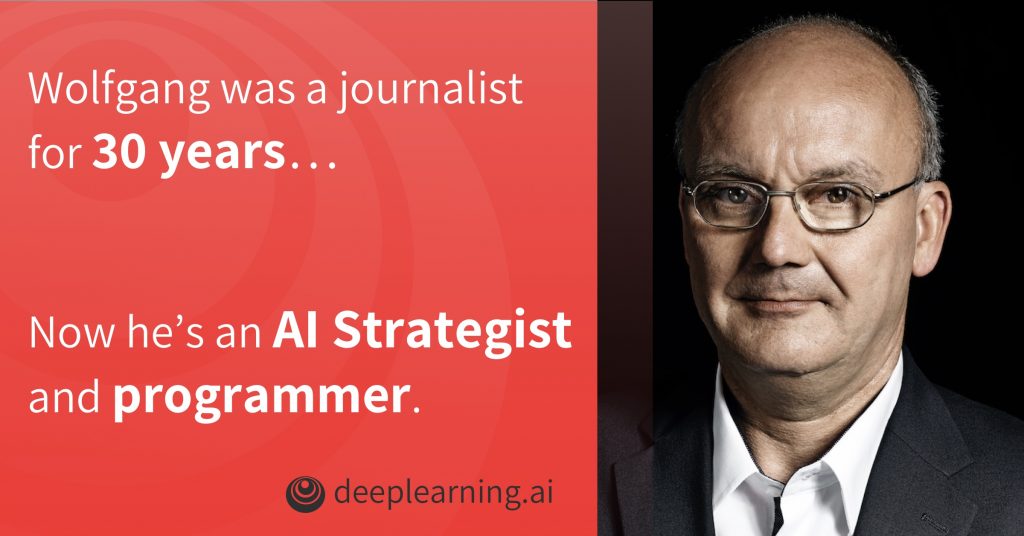Deep Learner Spotlight: Wolfgang Reuter
Introduce yourself: What’s your background?
I am a Senior AI Strategist in the applied AI initiative at Unternehmertum, a German start-up incubator and innovation consultancy. I also work freelance as an AI programmer. These jobs all started after I completed various Deep Learning courses on Coursera, including Andrew Ng’s Machine Learning course and also his Deep Learning Specialization. Before that, I worked as a journalist for almost 30 years for several prominent German publications, including Der Spiegel, Handelsblatt and Focus.
I had been teaching myself programming for about five years, and always liked the mix of creativity and stringent logical thinking that coding requires. Switching into that field was on my mind for quite some time, but it was hard to give up a secure position. It wasn’t until I started to get into AI and machine learning that I finally thought, at the age of 52, it’s now or never.
It wasn’t easy switching careers. People knew me as a journalist and didn’t really believe that I could set up and train a neural network, or write clustering algorithms and decision trees. Now, after almost a year, they have more trust in my abilities. I do feel there is a strong bias towards young people in the industry, even though experience does help with any project. But it is an exciting and thrilling field to work in and I don’t regret my step at all. I believe that, at the end of one’s life, people almost never regret the things they have done as much as the things they haven’t done.
What sparked your interest in AI?
Last year, I started a project to classify painting styles. It was meant to be a first step; what I really wanted to do was to identify forged images. I tried a few things, all based on hand-coded features, using Bayes theorem. But I quickly realized that I had to learn more about machine learning to improve the model further. I looked on Coursera and found Andrew Ng’s Machine Learning course. I really liked it, so I took more courses, including the Deep Learning Specialization.
What was your level of familiarity with AI before taking the course?
I wasn’t familiar with any machine learning concepts, apart from linear regression and some other classical statistical methods. I studied Environmental Sciences back in the 1990s with a strong focus on Meteorology, Oceanography and Climate Change.
Having said that, what helped me learn machine learning was the spirit or approach towards data that I got from my Environmental Sciences studies. Climatologists are probably the most creative people when it comes to data, mainly because historical measurements of meteorological properties are available for a century or maybe a bit longer. Let me put it this way: If you told a statistician, “I am now going to look at 14,000 medieval paintings in order to extract a temperature curve for the Middle Ages,” he or she would think you lost your mind. But climatologists did that and it worked. In other words, having the experience and trust that there is information in data where we do not expect or cannot even see it at first was helpful to learn machine learning.
What advice would you give to a learner who is just starting out?
Building a neural network from scratch helped me understand the concepts much better than if the course had used only off-the-shelf libraries. I would strongly recommend taking this part seriously and not using readily available tools as a shortcut. I also thought the programming assignments really helped and left enough room for learners to develop them further. I would recommend using them as a baseline code and applying them to different datasets or even different projects. Doing that will force you to go into the utility modules and alter some functions, for example, all of which help you learn and understand what is going on in the code.
How do you continue to learn Deep Learning?
I applied the concepts I learned in the Specialization to my painter classification and forgery detection project. When I started working on other projects, I had to go beyond the scope of the course. But with the foundation the course provides, the added research wasn’t a problem.
Whenever I work on a project, there are moments where I go back to the course material of the Specialization to double check or revise my understanding of the material and concepts. But in general, the Specialization enabled me to completely change my career and start a new and exciting professional life.
What are you currently working on?
I just finished a project for a customer that anonymizes license plates on images, as license plates are considered personal data in Germany. Now I am working on a model that reads out the mileage of a car from images of dashboards. And if I find a sponsor or partner, I will also keep working on my original project to identify forged images.
Anything else you’d like to share?
I am always amazed that people are afraid of AI and fear that intelligent robots might take over the world at some point. In my opinion, almost every invention of mankind or any skill humans acquired is aimed at outperforming our abilities. Riding on a horse is faster than running, and driving a car is faster than riding a horse. Humans can’t fly, but with a plane they can travel through the air. That’s how I feel about AI: It is a tool that (in many cases) outperforms the abilities of humans. And like with many other inventions and skills achieved in history, it will have an impact on societies. But societies always have adapted to new inventions. I am sure we also will with AI.
